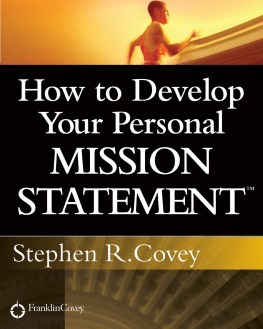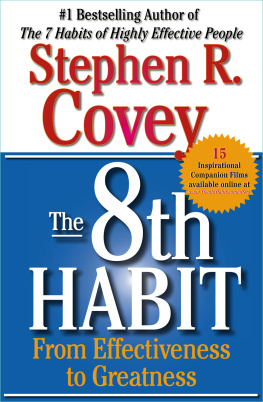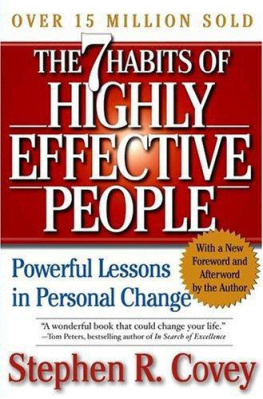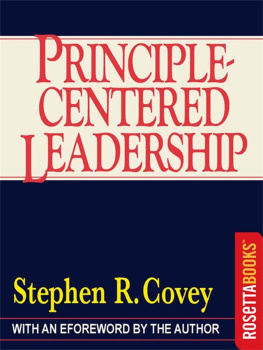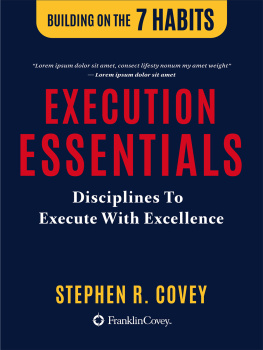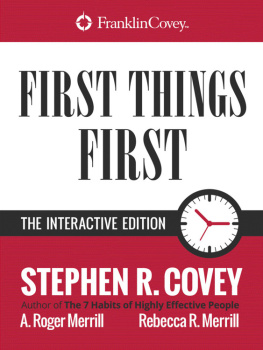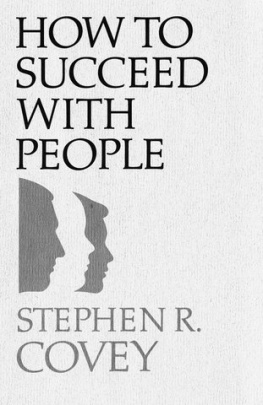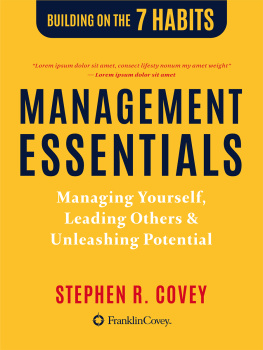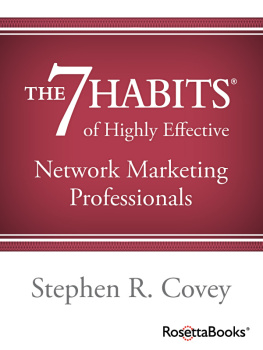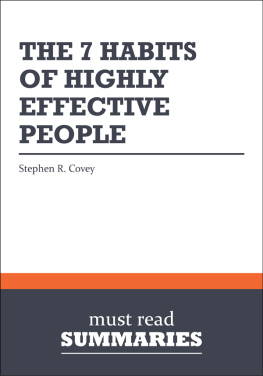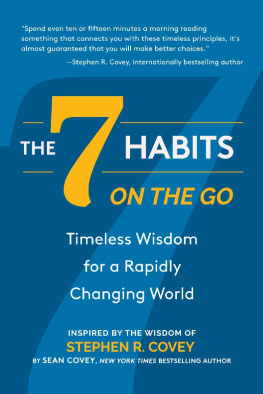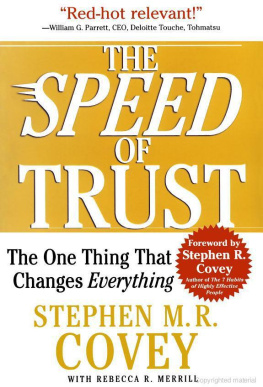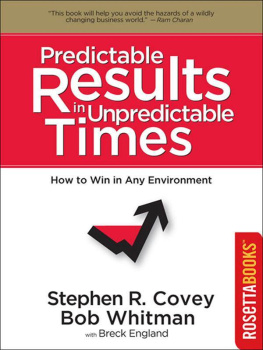Stephen R. Covey - How to Develop Your Personal Mission Statement
Here you can read online Stephen R. Covey - How to Develop Your Personal Mission Statement full text of the book (entire story) in english for free. Download pdf and epub, get meaning, cover and reviews about this ebook. year: 2013, genre: Religion. Description of the work, (preface) as well as reviews are available. Best literature library LitArk.com created for fans of good reading and offers a wide selection of genres:
Romance novel
Science fiction
Adventure
Detective
Science
History
Home and family
Prose
Art
Politics
Computer
Non-fiction
Religion
Business
Children
Humor
Choose a favorite category and find really read worthwhile books. Enjoy immersion in the world of imagination, feel the emotions of the characters or learn something new for yourself, make an fascinating discovery.
- Book:How to Develop Your Personal Mission Statement
- Author:
- Genre:
- Year:2013
- Rating:3 / 5
- Favourites:Add to favourites
- Your mark:
- 60
- 1
- 2
- 3
- 4
- 5
How to Develop Your Personal Mission Statement: summary, description and annotation
We offer to read an annotation, description, summary or preface (depends on what the author of the book "How to Develop Your Personal Mission Statement" wrote himself). If you haven't found the necessary information about the book — write in the comments, we will try to find it.
How to Develop Your Personal Mission Statement — read online for free the complete book (whole text) full work
Below is the text of the book, divided by pages. System saving the place of the last page read, allows you to conveniently read the book "How to Develop Your Personal Mission Statement" online for free, without having to search again every time where you left off. Put a bookmark, and you can go to the page where you finished reading at any time.
Font size:
Interval:
Bookmark:


Text copyright 2013 FranklinCovey Co.
All rights reserved.
No part of this book may be reproduced, or stored in a retrieval system, or transmitted in any form or by any means, electronic mechanical, photocopying, recording, or otherwise, without express written permission of the publisher.
Published by Brilliance Publishing
1704 Eaton Drive
Grand Haven, MI 49417
Digital ISBN: 9781477898048
A personal mission statement is based on Habit Two of The 7 Habits of Highly Effective People called Begin with the End in Mind. In ones life, the most effective way to begin with the end in mind is to develop a mission statement, one that focuses on what you want to be in terms of character and what you want to do in reference to contributions and achievements. It is based upon self-chosen values and principles.
Victor Hugo once said, There is nothing as powerful as an idea whose time has come. A mission statement is that idea. You may call it a credo or a philosophy; or you may call it a purpose statement. Its not important what it is called. What is important is that vision, purpose, and values are more powerful, more significant, and more influential than the baggage of the past or the accumulated noise of the present. The power of the personal mission statement lies in your vision and in a commitment to that vision, that purpose, and those principle-centered values. They will control your decisions, determine your outlook, and provide the direction for your future.
The single most important and far-reaching leadership activity that you will ever do is to develop a personal mission statementand then to bring that sense of mission, of purpose, to your family.
This book is a simple, short guide to developing your personal mission statement. After you develop your personal mission statement, consider also developing one with your family as described in the separate book How to Develop Your Family Mission Statement.
The Personal Mission Statement
Think about taking a trip on an airplane. Before taking off, the pilot has a very clear destination in mind, which hopefully coincides with yours, and a flight plan to get there. The plane takes off at the appointed hour toward that predetermined destination. But in fact, the plane is off course at least 90 percent of the time. Weather conditions, turbulence, and other factors cause it to get off track. However, feedback is given to the pilot constantly, who then makes course corrections and keeps coming back to the exact flight plan, bringing the plane back on course. And often, the plane arrives at the destination on time.
Its amazing. Think of it. Leaving on time, arriving on time, but off course 90 percent of the time. If you can create this image of an airplane, a destination, and a flight plan in your mind, then you understand the purpose of a personal mission statement. It is the picture of where you want to end upthat is, your destination is the values you want to live your life by. Even if you are off course much or most of the time but still hang on to your sense of hope and your vision, you will eventually arrive at your destination. You will arrive at your destination and usually on time. Thats the whole pointwe just get back on course.
This ideathis principleof beginning with the end in mind is based upon the concept that all things are created twice: first in the mind, as a thought or intellectual creation; and second in reality as a physical creation.
The mental creation, the flight plan, brings forth the hope in the flight. Norman Cousins taught, The capacity for hope is the most significant fact of life. It gives human beings a sense of destination and the energy to get started. At the beginning of this process you will find enormous hope and encouragement as well as fun and happiness in developing a mission statement. Its truly an enjoyable process. Its also a leadership process.
But heres something to think about carefully. The opposite of a mission statement is the opposite of beginning with the end in mind: beginning with no end in mind, no intellectual creation, no envisioning of the future. In other words, to let life happen. To be swept along with the flow of societys values and social trends without any sense of compass, without a map, without vision, without purpose. In a sense, someone else has done the creation of your mission statement for you and, unaware, youre simply living out the script that has been given to you. Youre really not living; youre being lived.
Thats why highly effective business and athletic teams all have a game plan, a vision of their destination. Consider the human body as a beautiful model of this idea. The DNA chromosomal structure that lies inside every cell of our body has a mission statement about what it and what the entire body is, how it functions, how it relates to other cells, and what it will become.
We are talking about the most basic principle manifest in all nature; that is, the habit of beginning with the end in mind. Its all based on this principle that all things are created twice. Therefore, take charge of the first creation, or someone or something else will.
Youre really not living; youre being lived.A Sense of Meaning
One of the most inspirational people I have ever known is Viktor Frankl, the Austrian psychiatrist who was imprisoned in the death camps of Nazi Germany in World War II. He was a scientist. He was terribly inquisitive and understood scientific methodology, and he wondered what enabled some of the prisoners who were subject to such terrible treatment in the death camps to survive.
He studied the survivors and attempted to understand what enabled these people to survive, unlike the hundreds of thousands who perished. Was it their physical health? He found physical health to be secondary. Was it their survival skills? Secondary. Was it their intelligence? Secondary. He explored every alternative hypothesis. He finally concluded they were all secondary factors.
The overriding primary factor was very simplethey had a sense of the future, a sense of purpose, a sense of meaning. Based on his studies, he wrote his famous book, Mans Search for Meaning. Those survivors were people who had a sense that some important work was yet to be done. He spoke about it as detecting rather than inventing their meaning. What is life asking of me? What is my responsibility in this situation? What kind of future contribution can I possibly make? By asking and answering these kinds of questions, they were strengthened and emboldened toward those purposes. And it enabled these people to survive.
Ill never forget the language he used: Our wounds would heal. This sense of the future somehow triggered the healing mechanisms and immune system inside their minds and bodies. The sense that they could make a better future gave them a deep feeling of hope. He quoted Nietzsche: He who has a why can live with any what.
Dr. Frankl hypothesized that we have three parts to our nature: our body, our mind, and our spirit. But his deepest conviction is that mostnot alldiseases originate in the spirit. That is, in a sense of meaninglessness, a sense of hollowness, a sense of purposelessness. No mission. No vision. No future. And that this void, this hollowness, translates itself into both the mind and the body.
Next pageFont size:
Interval:
Bookmark:
Similar books «How to Develop Your Personal Mission Statement»
Look at similar books to How to Develop Your Personal Mission Statement. We have selected literature similar in name and meaning in the hope of providing readers with more options to find new, interesting, not yet read works.
Discussion, reviews of the book How to Develop Your Personal Mission Statement and just readers' own opinions. Leave your comments, write what you think about the work, its meaning or the main characters. Specify what exactly you liked and what you didn't like, and why you think so.

